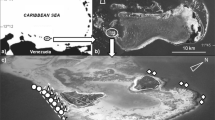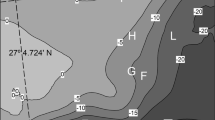Abstract
Lionfish are successful invasive predators in the Caribbean region and inhabit a large range of habitats. Our study in the Caribbean has focused on the relationships between the biological characteristics of lionfish particularly their size, their activities and use of those different habitats. In this study, we observed a high number of lionfish individuals, focusing on the behavioural activities and biological traits in relation to different habitats and environmental characteristics. We monitored 793 individuals, recording their activities, biological traits, and habitat characteristics. Our results report that lionfish are not solitary, but frequently form groups for many activities. We provide evidence of differences between lionfish habitat use according to activity, and the size of individual fish. Considering the size is correlated with age, coral reefs appear to be the preferred habitat of older individuals, whereas the youngest lionfish use a diversity of habitats, ranging from mangroves to coral reefs. In addition, this study suggests that predation of lionfish is age-dependent strategy, and depends on time and the tone of the environment. Lionfish do not only use the head-down posture to catch prey but also horizontal and head-up postures. The youngest lionfish hunt mainly in dark areas and during the night while the older fish were observed hunting mostly during the day and in clear areas. These new aspects of lionfish ecology and behaviour are discussed in light of their invasive success.








Similar content being viewed by others
References
Albins MA, Hixon MA (2008) Invasive Indo-Pacific lionfish Pterois volitans reduce recruitment of Atlantic coral-reef fishes. Mar Ecol Prog Ser 367:233–238. https://doi.org/10.3354/meps07620
Albins MA, Hixon MA (2013) Worst case scenario: potential long-term effects of invasive predatory lionfish (Pterois volitans) on Atlantic and Caribbean coral-reef communities. Environ Biol Fish 96(10–11):1151–1157. https://doi.org/10.1007/s10641-011-9795-1
Albins MA, Lyons PJ (2012) Invasive red lionfish Pterois volitans blow directed jets of water at prey fish. Mar Ecol Prog Ser 448:1–5. https://doi.org/10.3354/meps09580
Altmann J (1974) Observational study of behaviour: sampling methods. Behaviour 49(3–4):465–472
Anton A, Simpson MS, Vu I (2014) Environmental and biotic correlates to lionfish invasion success in Bahamian Coral Reefs. PLoS One 9(9):e106229. https://doi.org/10.1371/journal.pone.0106229
Anton A, Cure K, Layman CA, Puntila R, Simpson MS, Bruno JF (2016) Prey naiveté to invasive lionfish Pterois volitans on Caribbean coral reefs. Mar Ecol Prog Ser 544:257–269. https://doi.org/10.3354/meps11553
Barbour AB, Montgomery ML, Adamson AA, Díaz-Ferguson E, Silliman BR (2010) Mangrove use by the invasive lionfish Pterois volitans. Mar Ecol Prog Ser 401:291–294. https://doi.org/10.3354/meps08373
Barbour AB, Allen MS, Frazer TK, Sherman KD (2011) Evaluating the potential efficacy of invasive lionfish (Pterois volitans) removals. PLoS One 6(5):e19666. https://doi.org/10.1371/journal.pone.0019666
Bejarano S, Lohr K, Hamilton S, Manfrino C (2014) Relationships of invasive lionfish with topographic complexity, groupers, and native prey fishes in little Cayman. Mar Biol 162(2):253–266
Benkwitt CE (2016) Invasive lionfish increase activity and foraging movements at greater local densities. Mar Ecol Prog Ser 558:255–266. https://doi.org/10.3354/meps11760
Biggs CR, Olden JD (2011) Multi-scale habitat occupancy of invasive lionfish (Pterois volitans) in coral reef environments of Roatan, Honduras. Aquat Invasions 6(3):447–453
Black AN, Weimann SR, Imhoff VE, Richter ML, Itzkowitz M (2014) A differential prey response to invasive lionfish, Pterois volitans: prey naïveté and risk-sensitive courtship. J Exp Mar Biol Ecol 460:1–7. https://doi.org/10.1016/j.jembe.2014.06.002
Cardwell JR, Liley NR (1991) Hormonal control of sex and color change in the stoplight parrotfish, Sparisoma viride. Gen Comp Endocrinol 81(1):7–20. https://doi.org/10.1016/0016-6480(91)90120-U
Céréghino R, Park YS (2009) Review of the self-organizing map (SOM) approach in water resources: commentary. Environ Model Softw 24(8):945–947. https://doi.org/10.1016/j.envsoft.2009.01.008
Claydon JAB, Calosso MC, Traiger SB (2011) Progression of invasive lionfish in seagrass, mangrove and reef habitats. Mar Ecol Prog Ser 448:119–129
Crowder LB, Cooper WE (1982) Habitat structural complexity and the interaction between bluegills and their prey. Ecology 63(6):1802–1813. https://doi.org/10.2307/1940122
Cure K, McIlwain JL, Hixon MA (2014) Habitat plasticity in native Pacific red lionfish Pterois volitans facilitates successful invasion of the Atlantic. Mar Ecol Prog Ser 506:243–253. https://doi.org/10.3354/meps10789
Dahlgren CP, Eggleston DB (2000) Ecological processes underlying ontogenetic habitat shifts in a coral reef fish. Ecology 81(8):2227–2240.
Diller JL, Frazer TK, Jacoby CA (2014) Coping with the lionfish invasion: evidence that naïve, native predators can learn to help. J Exp Mar Biol Ecol 455:45–49. https://doi.org/10.1016/j.jembe.2014.02.014
Edwards MA, Frazer TK, Jacoby CA (2014) Age and growth of invasive lionfish (Pterois spp.) in the Caribbean Sea, with implications for management. Bull Mar Sci 90(4):953–966. https://doi.org/10.5343/bms.2014.1022
Endler JA (1984) Natural and sexual selection on color patterns in poeciliid fishes. In: Zaret TM (ed) Evolutionary ecology of Neotropical freshwater fishes. Springer, New York, pp 95–111. https://doi.org/10.1007/978-94-015-7682-6_7
Fishelson L (1975) Ethology and reproduction of pteroid fishes found in the Gulf of Aqaba (Red Sea), especially Dendrochirus brachypterus (Cuvier), (Pteroidae, Teleostei). Pubb Stn Zool Napoli 39:635–656
Frazer TK, Jacoby CA, Edwards MA, Barry SC, Manfrino CM (2012) Coping with the lionfish invasion: can targeted removals yield beneficial effects? Rev Fish Sci 20(4):185–191. https://doi.org/10.1080/10641262.2012.700655
Grabowski JH (2004) Habitat complexity distrups predator-prey interactions but not the trophic cascade on oyster reefs. Ecology 85(4):995–1004. https://doi.org/10.1890/03-0067
Green SJ, Côté IM (2014) Trait-based diet selection: prey behavior and morphology predict vulnerability to predation in reef fish communities. J Anim Ecol 83(6):1451–1460. https://doi.org/10.1111/1365-2656.12250
Green SJ, Akins JL, Côté IM (2011) Foraging behaviour and prey consumption in the indo-Pacific lionfish on Bahamian coral reefs. Mar Ecol Prog Ser 433:159–167. https://doi.org/10.3354/meps09208
Guthrie DM (1986) Role of vision in fish behaviour. In: Pitcher TJ (ed) Behaviour of teleost fishes, 2nd edn. Chapman & Hall, London, pp 75–113. https://doi.org/10.1007/978-1-4684-8261-4_4
Hackerott S, Valdivia A, Green SJ, Côté IM, Cox CE, Akins L, Layman CA, Precht WF, Bruno JF (2013) Native predators do not influence invasion success of Pacific lionfish on Caribbean reefs. PLoS One 8(7):e68259. https://doi.org/10.1371/journal.pone.0068259
Harmelin-Vivien ML (1975) Place of Apogonid fish in the food webs of a Malagasy coral reef. Micronesica 11:185–198
Hawkes JW (1974) The structure of fish skin. Cell Tissue Res 149(2):159–172. https://doi.org/10.1007/BF00222271
Hoare DJ, Couzin ID, Godin JGJ, Krause JK (2004) Context-dependent group size choice in fish. Anim Behav 67(1):155–164. https://doi.org/10.1016/j.anbehav.2003.04.004
Hobson E, Chess J (1978) Trophic relationships among fishes and plankton in the lagoon at Enewetak atoll, Marshall Islands. Fish Bull 76:133–153
Jadot C, Donnay A, Acolas ML, Cornet Y, Bégout Anras ML (2006) Activity patterns, home-range size, and habitat utilization of Sarpa salpa (Teleostei: Sparidae) in the Mediterranean Sea. Mark Sci 63:128–139
Johnson EG, Swenarton MK (2016) Age, growth and population structure of invasive lionfish (Pterois volitans/miles) in northeast Florida using a length-based, age-structured population model. PeerJ 4:e2730. https://doi.org/10.7717/peerj.2730
Jud ZR, Layman CA (2012) Site fidelity and movement patterns of invasive lionfish, Pterois spp., in a Florida estuary. J Exp Mar Biol Ecol 414:69–74
Jud ZR, Layman CA, Lee JA, Arrington DA (2011) Recent invasion of a Florida (USA) estuarine system by lionfish Pterois volitans/P. miles. Aquat Biol 13(1):21–26. https://doi.org/10.3354/ab00351
Kohonen T (2001) Self-organizing maps, 3rd edn. Springer, Berlin. https://doi.org/10.1007/978-3-642-56927-2
Layman CA, Allgeier JE (2011) Characterizing trophic ecology of generalist consumers: a case study of the invasive lionfish in The Bahamas. Mar Ecol Prog Ser 448:131–141
Layman CA, Jud ZR, Nichols P (2014) Lionfish alter benthic invertebrate assemblages in patch habitats of a subtropical estuary. Mar Biol 161(9):2179–2182. https://doi.org/10.1007/s00227-014-2491-x
Lönnstedt OM, McCormick MI (2013) Ultimate predators: lionfish have evolved to circumvent prey risk assessment abilities. PLoS One 8(10):e75781. https://doi.org/10.1371/journal.pone.0075781
Lönnstedt OM, Ferrari MCO, Chivers DP (2014) Lionfish predators use flared fin displays to initiate cooperative hunting. Biol Lett 10(6):20140281. https://doi.org/10.1098/rsbl.2014.0281
Lukoschek V, McCormick MI (2001) Ontogeny of diet changes in a tropical benthic carnivorous fish, Parupeneus barberinus (Mullidae): relationship between foraging behaviour, habitat use, jaw size, and prey selection. Mar Biol 138(6):1099–1113. https://doi.org/10.1007/s002270000530
Maljković A, Van Leeuwen TE, Cove SN (2008) Predation on the invasive red lionfish, Pterois volitans (Pisces: Scorpaenidae), by native groupers in the Bahamas. Coral Reefs 27(3):501. https://doi.org/10.1007/s00338-008-0372-9
Marsh-Hunkin KE, Gochfeld DJ, Slattery M (2013) Antipredator responses to invasive lionfish, Pterois volitans: interspecific differences in cue utilization by two coral reef gobies. Mar Biol 160(4):1029–1040. https://doi.org/10.1007/s00227-012-2156-6
McTee SA, Grubich JR (2014) Native densities, distribution, and diurnal activity of Red Sea lionfishes (Scorpaenidae). Mar Ecol Prog Ser 508:223–232. https://doi.org/10.3354/meps10847
Mittelbach GG (1981) Foraging efficiency and body size: a study of optimal diet and habitat use by bluegills. Ecology 62(5):1370–1386. https://doi.org/10.2307/1937300
Montgomery CJ, Hamilton AR (1996) Sensory contributions to nocturnal prey capture in the dwarf scorpion fish (Scorpaena papillosus). Mar Freshw Behav Physiol 30(4):209–223
Morris JA Jr, Akins JL (2009) Feeding ecology of invasive lionfish (Pterois volitans) in the Bahamian archipelago. Environ Biol Fish 86(3):389–398. https://doi.org/10.1007/s10641-009-9538-8
Morris JA Jr, Whitfield PE (2009) Biology, ecology, control and Management of the Invasive Indo-Pacific Lionfish: an updated integrated assessment. NOAA Technical Memorandum NOS NCCOS 99
Moyer JT, Zaiser MJ (1981) Social organization and spawning behavior of the pteroine fish Dendrochirus zebra at Miyake-jima, Japan. Jpn J Ichthyol 28:52–69
Nagelkerken I, Kleijnen S, Klop T, van den Brand RACJ, Cocheret de la Morinière E, van der Velde G (2001) Dependence of Caribbean reef fishes on mangroves and seagrass beds as nursery habitats: a comparison of fish faunas between bays with and without mangroves/seagrass beds. Mar Ecol Prog Ser 214:225–235. https://doi.org/10.3354/meps214225
O'Farrell S, Bearhop S, McGill RA, Dahlgren CP, Brumbaugh DR, Mumby PJ (2014) Habitat and body size effects on the isotopic niche space of invasive lionfish and endangered Nassau grouper. Ecosphere 5(10):art123
Packard A, Sanders GD (1971) Body patterns of Octopus vulgaris and maturation of the response to disturbance. Anim Behav 19(4):780–790. https://doi.org/10.1016/S0003-3472(71)80181-1
Pimiento C, Nifong JC, Hunter ME, Monaco E, Silliman BR (2013) Habitat use patterns of the invasive red lionfish Pterois volitans: a comparison between mangrove and reef systems in San Salvador, Bahamas. Mar Ecol 36(1):28–37
Raymond WW, Albins MA, Pusack TJ (2015) Competitive interactions for shelter between invasive Pacific red lionfish and native Nassau grouper. Environ Biol Fish 98(1):57–65. https://doi.org/10.1007/s10641-014-0236-9
Rizzari JR, Lönnstedt OM (2014) Cooperative hunting and gregarious behaviour in the zebra lionfish, Dendrochirus zebra. Mar Biodivers 44(4):467–468. https://doi.org/10.1007/s12526-014-0215-6
Valdez-Moreno M, Quintal-Lizama C, Gómez-Lozano R, García-Rivas MC (2012) Monitoring an alien invasion: DNA barcoding and the identification of lionfish and their prey on coral reefs of the Mexican Caribbean. PLoS One 7(6):e36636. https://doi.org/10.1371/journal.pone.0036636
Valdivia A, Bruno JF, Cox CE, Hackerott S, Green SJ (2014) Re-examining the relationship between invasive lionfish and native grouper in the Caribbean. PeerJ 2:e348. https://doi.org/10.7717/peerj.348
Acknowledgements
We would like to thank CONANP (Comisión Nacional de Areas Naturales Protegidas, Mexico) as well as Banco Chinchorro Biosphere Reserve for the important support provided during fieldwork, and two anonymous reviewers for their helpful commentaries. We are also grateful to Estefanía Medina Bastarrachea for creating the map.
Author information
Authors and Affiliations
Corresponding author
Ethics declarations
All applicable international, national, and/or institutional guidelines for the care and use of animals were followed.
Conflict of interest
The authors declare that they have no conflict of interest.
Rights and permissions
About this article
Cite this article
García-Rivas, M.d.C., Machkour-M’Rabet, S., Pérez-Lachaud, G. et al. Age-dependent strategies related to lionfish activities in the Mexican Caribbean. Environ Biol Fish 101, 563–578 (2018). https://doi.org/10.1007/s10641-018-0718-2
Received:
Accepted:
Published:
Issue Date:
DOI: https://doi.org/10.1007/s10641-018-0718-2




